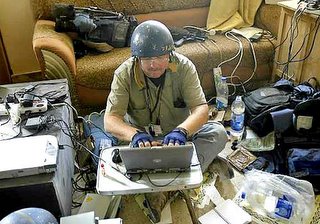
This is Patrick J. McDonnell of the LA Times. He has a story in the LA Times about his 2 years of reporting from Iraq. It covers alot of ground and though long it is absorbing. Here's a bit....
A friendly Sunni sheik accompanied us and provided the needed introductions in the conservative farm region, where the cycles of crops and prayer dictate daily life.For the rest
The late imam's extended male family—he came from a prominent tribe—greeted us along a canal amid the date palm-fringed ribbon of green that caresses the Euphrates. The men sat in the shade of the mourning tent, sipping tea and fingering beads. Sheikh Laith's father and uncles, all dressed in traditional tribal headdresses and robes, spoke with deep pride of the precocious scholar who now, indisputably, rested in paradise. Later, a longtime acquaintance, Ahmed Jasim, marveled at his friend's passing. "He has had a wonderful death," Jasim told me. "We are all hoping to have a similar end, to be martyrs like Sheikh Laith."
At the time, U.S. authorities—notably L. Paul Bremer III, the U.S. administrator and de facto proconsul—were dismissing the mounting attacks as desperation acts by "bitter enders" who would soon be annihilated by superior U.S. forces. But it never felt like that in Fallouja or elsewhere in western Iraq, where anger was building, arms and munitions were abundant and there was no shortage of volunteers—many unemployed young men gravitating in their discontent to militant mosques—to take on the U.S. troops.
The people of Sunni Arab Iraq, long divided by tribe and region of origin, had found a common enemy.
After the imam's wake, we drove into the town of Amriya to visit some of the dead man's followers, who had gathered at the house of an elderly and half-blind sheik. Abandoning caution, he began to complain that U.S. troops had arrested several area "boys" who had been transporting arms from the south. The young militants in the room quieted him and wondered aloud whether Suheil and I were intelligence agents. We quickly changed the subject to the imponderables of Sufist philosophy and then made an apologetic exit. "That was a very perilous moment, Mr. Patrick," Suheil advised me as we sped back toward Fallouja and its crown of minarets, our eyes on the rearview mirror.
It was becoming apparent—with every new ambush and roadside bombing, with most every interview I conducted—that this was going to be a long and bloody fight. Could it possibly be, I wondered, that the war was already lost?

No comments:
Post a Comment